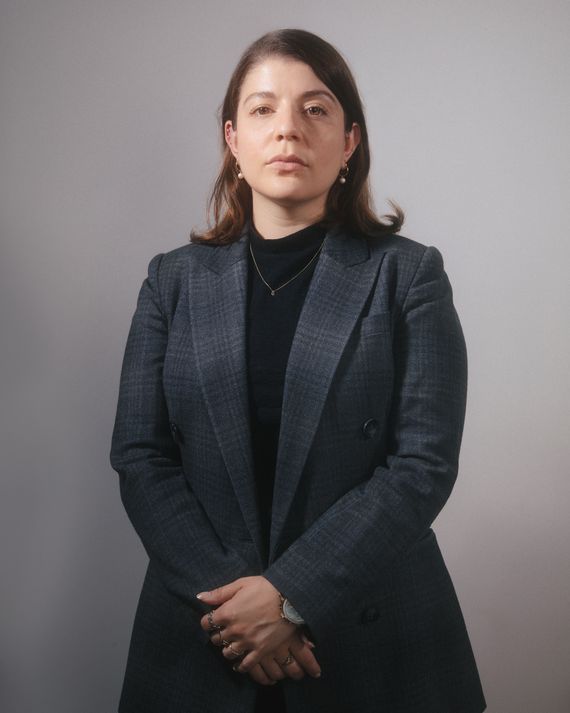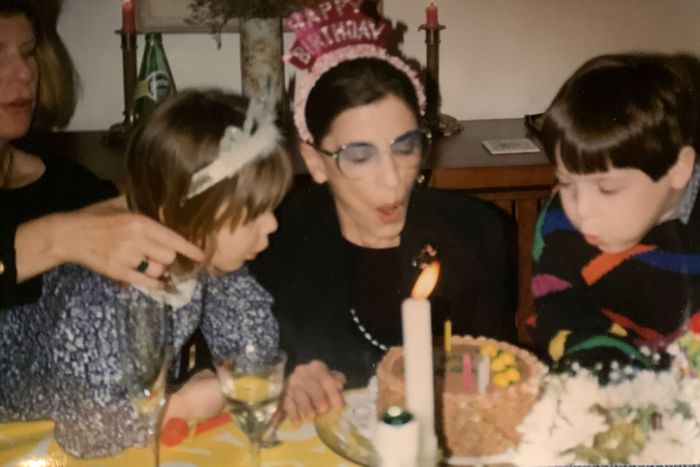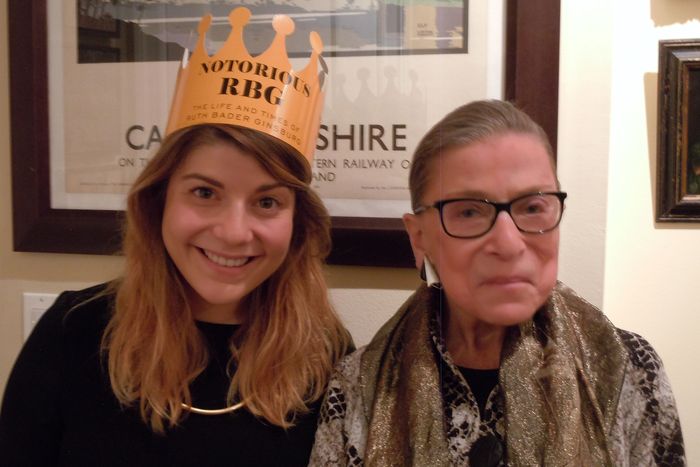
Shortly before her death on September 18, Ruth Bader Ginsburg decided to send a final message to the public — “My most fervent wish is that I will not be replaced until a new president is installed” — and she chose her granddaughter, Clara Spera, to take it down and tell the world. (The close bond between granddaughter and grandmother is obvious in the 2018 documentary RBG.) Spera, 30, is ambivalent about a broader role as spokesperson. She is, in her own words, a “young woman who’s really passionate about politics and is fired up just as much as anybody else.” But she is cognizant of her grandmother’s stated desire to have the courts be above politics, and she worries about having “a sound bite that blows up and is used as a conservative talking point. That scares me a lot.” Not to mention that Spera is following in gigantic footsteps — she works as a legal fellow at the ACLU’s recently renamed Ruth Bader Ginsburg Liberty Center, in the Reproductive Freedom Project. “I wish I were passionate about bankruptcy law, you know?” she joked. “I want to get work on my own merit. I want to establish myself as a lawyer in my own voice and on my own terms. And I am reluctant to do too much media or talk to too many people or even advertise my familial connection, because I wouldn’t even want the appearance of impropriety.” Nonetheless, she agreed to a conversation about intergenerational feminism, Antonin Scalia, her grandmother’s wish, and the Black Lives Matter movement.
I’m sure you’ve been asked many times about what your grandmother’s work has taught you. But I always thought you must have taught her a lot, too, about contemporary conversations — things happening on the internet, things happening with younger people.
I would definitely try to engage her in dinner-table conversations about contemporary feminist thought and what my generation was up to. We agreed on fundamental, basic principles but then how those are applied, or to whom they apply, I think is a more nuanced conversation. My generation is lucky because we get to engage in the world that my grandmother, and others alongside her and before her, established. Many of the things that she was fighting for are givens for me and my generation. And so we can think beyond that and think about how much further we can push.
Could you share an example of a conversation in which you felt you were helping her see in a different way?
We engaged in this on and off when it came to questions of sexual harassment in the workplace and on university campuses and thinking about that concept beyond just “Are you being harassed so much that you can’t do your job?” I think women of my grandmother’s generation had to put up with a lot of stuff that they should not have had to put up with. And now my generation and younger are saying, “Yeah, you shouldn’t have had to put up with it — nor should we. So how can we change the law, change practices, change society so this isn’t just something that all women have to go through in order to access certain conditions of power or certain employment, or just to exist in the world?”
You were the conduit of her final message — the shorthand is now “Honor Her Wish.” The phrase was on a mask that Representative Ayanna Pressley wore to pay her respects. What do you think about the fact that her wish has not been respected?
I think she was more hopeful that it would be respected than I ever was, so I’m not particularly surprised. And I think the fact that she even articulated it, and thought maybe it would do something, speaks, again, to her faith in institutions, in the Supreme Court, and her belief that generally people come to the table in good faith. And I think, I don’t know if it’s because of my age or my cynicism that she did not share, that I don’t have that view of politics today in America. I had very little expectation that a nominee would not be announced and confirmed before the election.
And how do you feel about it?
I’m frustrated, but my frustration stems more from my perspective as a political person in the country, as opposed to frustration with relation to her and my relationship to her.
In your interview with the BBC, you said your grandmother didn’t have regrets about not retiring under the Obama administration. Or that she never expressed them.
At least not to me.
Did you ever urge her to retire?
No. No.
I don’t know if you’ve been watching the Amy Coney Barrett hearings, but there has been a lot said, mainly by Republicans, about your grandmother’s relationship with Justice Scalia as sort of a model of how the hearings should be conducted or, I don’t know, to put a gloss of bipartisanship over her legacy. How do you feel when you hear their friendship used in this particular way?
I’m trying to be cautious of my language here. That they were good friends is a matter of public record. But that they deeply disagreed on basic things, like how to read the Constitution and interpret it and apply it, is also a matter of public record. I think that it is easy to point to their friendship as a shield to say, “Look, even a notable liberal and a notable conservative can get along. So, Democrats, why don’t you just get along and get onboard?” It’s an easy way to ignore the fact that Judge Barrett and other justices on the Supreme Court are far more conservative than Justice Scalia ever was.
That’s not to say my grandmother wasn’t, or wouldn’t have been, friends with people to the right of Justice Scalia. But I think it’s a lazy tactic to say, “Well, if these two people can get along, then why don’t you support this policy or this nominee.” And it’s sort of frustrating to me that conservatives in particular, but not uniquely, have weaponized their relationship as a way to gloss over serious questions of legal interpretation and philosophy.
And process, right? To invoke one aspect of her life while ignoring another one, which is also the same posture that would have wanted to see Merrick Garland get a hearing. That would have wanted the process to occur in a way that reflected a respect for the institutional norms, if not the rules.
Right. I think that everyone who’s been paying attention to the nomination process has no doubt that Judge Barrett is a kind person, a woman of faith, a family person, a civil person, and all sorts of great things. But that doesn’t discount her judicial philosophy, which often serves to exclude marginalized people.
And those two things can co-exist, and they co-existed with Justice Scalia as well. He was a gregarious, funny man, who also wrote some really terrible, in my opinion, things. So to just say, “These people were friends, and this person’s a wonderful mother,” serves to deflect from the actual issue at hand. Which is, how this person will be as a justice on the Supreme Court.
I think people who deploy their friendship in this way don’t listen to the part where she talked about her majority opinions being made better by his dissents. That professionally, it meant sharpening her arguments against him. And that the personal friendship didn’t materially change, in the realm of jurisprudence, the way things happened.
And there are people, and I don’t knock these people, who think, How could you be friends with someone like this, no matter how nice and funny they are? How could you be friends with someone with whom you share such deep disagreements that go to some of your very core values as a lawyer and legal thinker? I think that is a fair question to ask. But I don’t think it made my grandmother any less of a feminist or any less of a champion for women and marginalized people that she did have that friendship. But I want to acknowledge those critiques and say that I understand them.
There was a paradox with your grandmother’s body of work, in which she would talk a lot about civility and institutions. She would often cite advice from her mother that anger is a distraction or a waste of time.
Right.
But in reality, she often was angry. Especially near the end of her life, she was dissenting. Of course, she was using the tools of the Court, but it was not very civil the way she called out Trump, even though she apologized. I’ve talked about this a lot with Rebecca Traister, my colleague and friend, because she wrote a whole book about women and anger and change. She told me that at practically every talk she gives, somebody asks about Justice Ginsburg repeating the advice from her mother.
In the ’70s, being a woman and angry wouldn’t get you very far. It’s also important to remember the context in which she was working. She was in the courts. There were other venues, perhaps, where to be more emotive would be a successful strategy, but I don’t think that doing that in front an all-male three-judge panel, or nine male justices of the Supreme Court, would have helped her and her argument and her cause.
Again, this returns to the benefits that my generation has reaped from the work that she did, in that now I don’t think it is as unsettling or as strange for a woman to express anger. And I want to be clear that I mean a white woman. Because I think you still see this dichotomy, the stereotype of the quote “Angry Black woman.” So I think women of color do not get to be angry in the same way that white women or white-passing women get to get angry. And I think, if we go back to the ’70s, no women could be angry in the way that men could be angry. So we’ve moved forward with our ability to express anger, but this does not apply equally to all women and to all people.
92Y recently published some audio from an event your grandmother did there in February 1973, one of the earliest recordings, I think, that we know of. During the Q&A, she was asked about the angry women on television. I’m just going to read you what she said, because I thought it was really interesting:
“I think that probably if there had not been these angry women, we wouldn’t be at the point where we are today. I mean, I don’t think anyone seriously questions that the militants had a certain role to play in the Black civil-rights movement. You may deplore their tactics, but they made a lot of people think who had not thought before … When the message is understood, I think the continuation of that sort of thing is self-defeating.”
And then she talks about how whenever there’s a discussion about adding gender to a piece of civil-rights legislation, the legislators have said, “But the women are not rioting in the streets.” It sort of seems like a recognition of “Okay, well, create the pressure in the streets, and that will make it easier to pressure the legislators or to move through the courts.” Even if that was not her chosen method in the ’70s for herself, I don’t think she’s saying in there that you should never be angry on behalf of social change.
And I think she’s always made the connection between what happened in the courts and what’s going on in society. And when they are out of sync, that usually doesn’t go so well for the courts. And so I think that is a reflection of that philosophy.
Tell me about what made you want to work on reproductive rights.
It was just a given for the time period in which I became a lawyer. It’s embarrassing to admit, especially growing up in a liberal, self-congratulatory bubble in New York City, that I was never really aware of the restrictions on access to reproductive care until I got to law school. But very early on, when I got to law school, that perception was sort of shaken … As I learned more, and as I got to know the tight-knit community of reproductive-rights lawyers and the broader coalition that also involves reproductive-justice advocates, I became really passionate about the work.
And when I think about what I’d want to be doing right now as a lawyer in the United States in the time that we find ourselves in, there are few other subject-matter areas that I would want to devote my full self to. So I just count myself very privileged that I get to do this work during this time.
Can you tell me a little bit about the North Carolina case you’re working on right now?
The case is an omnibus challenge to laws that have been on the books in North Carolina for a while. The ACLU, alongside Planned Parenthood and the Center for Reproductive Rights, is suing on behalf of some clinics and individual doctors to tear down these laws and essentially to reopen access, or to further open access, in North Carolina.
SisterSong, an incredible reproductive-justice organization that’s mainly active in the South, is a plaintiff. It’s very important for the ACLU and our reproductive-rights coalition partners to amplify the voices of women of color, because women of color and poor women are those who feel the effects of these restrictions most acutely.
The coalition saw an opportunity based on the current makeup of the North Carolina state court, so this is a state court case, not a federal court case. And I think we will be seeing a lot more of those in the coming years. We saw an opportunity to try to tear down this sort of buildup of restrictions that make it more difficult than we want in order to access basic reproductive care that women are constitutionally entitled to.
Ria Tabacco Mar wrote about Cox v. Stanton, a case your grandmother helped bring in 1973 that challenged North Carolina’s forcible sterilization of women of color in particular. And it’s just really incredible to read the brief in that case, which we came across while working on Notorious RBG, because it makes an argument that this law was discriminating against Nial Ruth Cox because she was a woman, a Black woman, and a poor woman and received welfare benefits.
I think when you put it next to Susan Struck’s case and you put it next to your grandmother’s dissents on abortion-rights cases, it kind of creates a matrix of broader reproductive freedom that is fully defending abortion and contraception but also the right to bear a child. Which is part of the message women of color are bringing forward as part of their lived reality. In no way am I suggesting she invented that, but the work she was doing in the 1970s is so consistent with that framework.
Absolutely. It’s about choosing whether, when, and how to have a family and how to bring that family into the world. Fundamentally, it’s about controlling your body, and that goes just as much to bringing a pregnancy to term as it does to deciding to end a pregnancy.
I think the Black Lives Matter movement draws that into relief because part of its argument is about safety and dignity for Black children and Black mothers, and making what could be understood as a pro-life argument for Black lives who are already here with us, walking on this earth. Your Twitter is private, but I wonder if we could talk about something you wrote: “Today we bury my grandmother. She lived a full and an incredible life, but I’ll also be thinking about Breonna Taylor, whose life and dreams were stripped from her when she was murdered in her sleep. Her story matters just as much as Bubbie’s. Say her name. #blacklivesmatter.” Could you tell me a little about what was going through your head when you wrote this?
My grandmother dying was a very big event in our country for a plethora of reasons. But she got to live to the age of 87. As you pointed out, she beat the odds seemingly countless times. And so, even though there was a sort of lore about her immortality, we all knew somewhere inside that that wasn’t going to continue forever. Breonna Taylor, on the other hand, didn’t have the opportunity to flourish and to do the things that she wanted to do. So while it is heartbreaking for my family, and for many people in the country, that my grandmother passed away when she did, she got to do everything she ever could have dreamed of, and more.
You know, sometimes I think about how, if my grandmother had passed away after this election, and if Joe Biden is the winner of this election and becomes our president, people would certainly have been sad that she died, and there would have been a period of public mourning and a sense of loss, but it wouldn’t have been wrapped up in all of the politics that are coming along with it. It would have just been a celebration of her life and of her work, without this tinge of politics.
Did you ever talk with your grandmother about her remarks on Colin Kaepernick? Her first reaction was to not understand where that was coming from.
We talked about it, and I think this was a woman who was so outside of the world of sports and the NFL that she had truly no idea what Katie Couric was asking her. And it kind of came out of nowhere. I think that when you’re in your 80s, you don’t know about sports, you don’t know the background, and someone just says, “Someone’s kneeling during the national anthem, and it’s causing a stir.” Without the benefit of context, without the benefit of a deeper explanation, it’s not shocking to me that an octogenarian would sort of shrug their shoulders and say, “I don’t really get that. That doesn’t seem that compelling of a way to protest.” I think she and I were frustrated by that because it made her appear insensitive, uninformed, not supportive of the cause that Colin Kaepernick and, eventually, other athletes were supporting — mainly the end of police brutality, specifically in communities of color. Which is something that she certainly supported and certainly would get behind. But the sound bite was there, the clip was there. And I think that’s also a reflection of our hunger for media moments and sound bites and things that can be whittled down to a tweet.
I think it was unfortunate. But for me, it did not reflect her thoughts on issues of police brutality and racial discrimination in the country. And I think most people who engaged in her legal work and her scholarship would probably understand that as well.
It doesn’t reflect her historical view of protest, as she’d described it. So it seemed sort of like an aberration in terms of her overall worldview — that there’s the role of protest and then there’s the role of the courts and the role of the legislature, and they all kind of fit together in a way. One pushes the other. Did you end up explaining to her what the protest was about?
I think other people got to her before I did.
People who were once institutionalists, particularly elite lawyers, are now questioning — partly because of your grandmother’s death and the nomination process that followed — what they once never would have questioned about institutional norms of the Court. Adding seats but also trying to lessen the power of the courts. I know what your grandmother thought about it, but what do you think about it?
I think that the answer is that the courts, and certainly the federal courts, won’t save us. They are but one tool in a large arsenal of a means to achieve justice. And I think that a lot of lawyers are starting to think, How do we adjust, now that the federal courts in particular have been so changed in the past four years. I think that there are good arguments for saying that the courts shouldn’t be our first port of call — the federal courts. We discussed the North Carolina case that I’m a part of. That’s in state court, bringing state constitutional claims. There’s I think a lot more being done on the state level. Not just at the state courts but also in state legislatures and sort of local policy that is really going to become one of the front lines of the work towards achieving greater justice in this country.
That is exciting to me, but it’s also scary because that means a lot of this work is going to be done piecemeal. And one of the benefits of the federal courts, and certainly of the Supreme Court, is that you had nationwide resolution, often, and nationwide vindication of rights. And when that’s not as readily available anymore, there are certainly other outlets, but it will, I think, inevitably mean some people get left behind. And we have to pay attention to those people because, more likely than not, they’re going to be those who are more disenfranchised already.
I do think, and I think my grandmother believed too, that radical ideas can co-exist with more institutionalist ones, even though it sounds like an oxymoron. Obviously, there was her famous quote that “real change happens one step at a time.” And I think that’s true often but not always. By its very own term, the Revolutionary War was radical. I think that you need people engaging in both. You need people who are talking about and working towards completely reforming the system and upending things. What you can’t have is that conversation happening but then an abandonment in the sort of more institutional spaces. Because then the only people left in those institutional spaces are the people you don’t want left in those spaces alone. And until you achieve the radical change that you are righteously fighting for, then things will get worse and worse.
This interview has been edited and condensed.


































